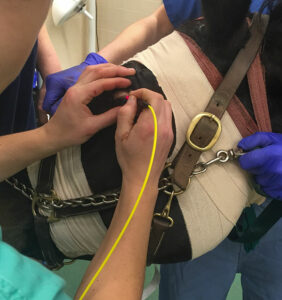
2.5% Injectable Polyacrylamide Hydrogel for Joint Healing in Horses
Recent study results show this treatment for osteoarthritis might benefit horses in both the short and long term.

Recent study results show this treatment for osteoarthritis might benefit horses in both the short and long term.

An expert reviews material showing 2.5% polyacrylamide hydrogel (PAAG) is effective, long-lasting, and safe for treating early- and late-stage equine osteoarthritis. Sponsored by Contura Vet.

Fluorescent light energy (FLE) promotes healing and provides antimicrobial activity and anti-inflammatory effects in equine wounds and skin conditions. Sponsored by Phovia.

Equine standing CT is an accurate diagnostic imaging tool that could make CT safer and more accessible due to its ease of use.

Data show frequent use of this OA treatment over time could be harmful in horses.

Veterinarians: Follow these 4 steps to maximize the success of injections in this region of the horse’s neck and minimize the risk of complications.

Learn about devices designed to measure equine athletes’ cardiac function and maximize performance.

Learn about 4 cutting-edge treatments for equine eye issues ranging from corneal ulcers to cancer.

Learn more about Class IV laser treatments, the current research, and opportunities for further advancement.

Modalities ranging from PEMF to vibration plates might help manage equine injury or improve performance.

Researchers are exploring improved ways to heal these notoriously complicated soft tissue structures.

Horses have a wide range of potential for exposure to toxicants; understanding this could help protect them.

Blood flow restriction (BFR), a human rehab modality, was found to be safe and well-tolerated by horses in a pilot study.

Brush up on your equine oral health knowledge with these facts about dental anatomy, issues, and exams.

Dr. Gustavo Zanotto of Texas A&M University describes autologous blood products, how they work, the existing research supporting them, and their applications in horses in this Dechra-sponsored online presentation.

The key concepts behind 6 orthobiologics available to equine veterinarians.
Stay on top of the most recent Horse Health news with
© 2022 Copyright Statement dolor sit amet, consetetur sadipscing User Terms, sed diam nonumy eirmod tempor invidunt ut labore et dolore magna aliquyam erat, sed diam voluptua. At vero eos et accusam et justo duo dolores et ea rebum. Stet clita kasd gubergren, no sea takimata sanctus est Lorem ipsum dolor sit amet.
"*" indicates required fields